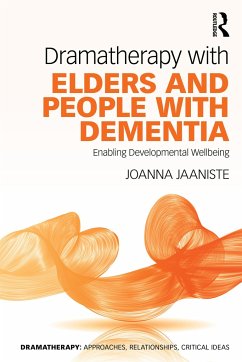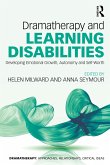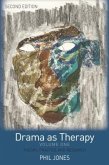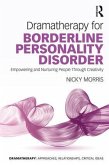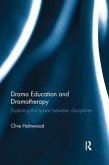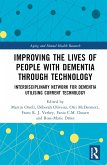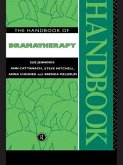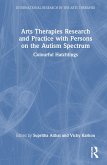Dramatherapy with Elders and People with Dementia illuminates how targeted sessions of dramatherapy can improve the quality of life of elderly people with dementia.
The book takes the reader through the dramatherapy experience of a group of people who display a 'feeling intelligence'; a quality that softens distress at vanishing words and clouded memories. Unique in its approach, not only to dramatherapy with elders and people with dementia, it presents an essential validation of older people's life stage development.
Rather than being different or 'other', Jaaniste paints word pictures to show human qualities such people have in common with their dementia-free contemporaries. Readers will glean insights into the arts therapies, especially creative drama, meeting examples of elder wisdom, wit and resilience in dealing with life, but especially grief, loss, and deep questions that come with ageing.
Enriched with vignettes and anecdotes based on rigorous research and measurement, the book will be suitable for adaptation by arts therapists and other allied health professionals who are interested in using person-centred, strengths-based approaches.
The book takes the reader through the dramatherapy experience of a group of people who display a 'feeling intelligence'; a quality that softens distress at vanishing words and clouded memories. Unique in its approach, not only to dramatherapy with elders and people with dementia, it presents an essential validation of older people's life stage development.
Rather than being different or 'other', Jaaniste paints word pictures to show human qualities such people have in common with their dementia-free contemporaries. Readers will glean insights into the arts therapies, especially creative drama, meeting examples of elder wisdom, wit and resilience in dealing with life, but especially grief, loss, and deep questions that come with ageing.
Enriched with vignettes and anecdotes based on rigorous research and measurement, the book will be suitable for adaptation by arts therapists and other allied health professionals who are interested in using person-centred, strengths-based approaches.
This fascinating, innovative contribution to knowledge is invaluable to all those involved in the wellbeing of elders and people with dementia. It provides vivid accounts of research into practice and will inspire and support those working with client experiences of loss, grief or trauma and with the joys of living in the moment and of spirituality. I am deeply moved by the many examples that illuminate how drama and creativity can be brought into the lives of individuals and groups in ways that enhance their quality of life. The rigour of thinking offered by Jaaniste in her planning and devising, alongside the verve and deep empathy she brings to understanding the impact of her work is inspirational. Chapters on approaches in research, assessment and evaluation will speak to practitioners and researchers in a variety of professions. 'Dramatherapy with elders and people with dementia' enables learning to happen in a vivid way: reading this text takes us directly into the spaces and activities where change is happening and into the mind of a dramatherapist alive and alert to the meanings of her practice and how her own learning and insight can be shared with us to enable our own discoveries as readers. This is an important, key text in the fields of practice with elders and people with dementia, the arts therapies and dramatherapy. It deserves to be essential reading on professional courses and for practitioners and carers.
Phil Jones, Professor Head of Research Ethics and Governance, UCL Institute of Education, author The arts therapies: A revolution in Healthcare (2nd ed.) and Drama as therapy volume 2: Clinical work and research into practice.
This book summarises art therapies and dramatherapy and how to use such approaches with people living with dementia. This is a valuable textbook for health professionals looking for an alternative psychosocial approach to add to their dementia care toolkit. The chapter exploring intelligence of feeling and dramatherapy is significant in helping readers employ this approach.
Wendy Moyle, Professor, Program Director Menzies Health Institute Queensland, Griffith University
This book explores Western concepts of aging, dementia and dramatherapy, situated in the Australian context. It speaks to the value of working actively through dramatherapy to create connection with self and other, past and present, to meet the developmental tasks of living and ageing with dementia.
Kirsten Meyer, PhD, dramatherapist.
This book earns Joanna the absolute right to be considered a leading expert in the field of providing effective services with people with dementia. She skilfully combines research, examples of clinical practice and an overview of the ageing processes in this engaging and extremely readable book.
Madeline Andersen-Warren, dramatherapist (retired), author and researcher.
Phil Jones, Professor Head of Research Ethics and Governance, UCL Institute of Education, author The arts therapies: A revolution in Healthcare (2nd ed.) and Drama as therapy volume 2: Clinical work and research into practice.
This book summarises art therapies and dramatherapy and how to use such approaches with people living with dementia. This is a valuable textbook for health professionals looking for an alternative psychosocial approach to add to their dementia care toolkit. The chapter exploring intelligence of feeling and dramatherapy is significant in helping readers employ this approach.
Wendy Moyle, Professor, Program Director Menzies Health Institute Queensland, Griffith University
This book explores Western concepts of aging, dementia and dramatherapy, situated in the Australian context. It speaks to the value of working actively through dramatherapy to create connection with self and other, past and present, to meet the developmental tasks of living and ageing with dementia.
Kirsten Meyer, PhD, dramatherapist.
This book earns Joanna the absolute right to be considered a leading expert in the field of providing effective services with people with dementia. She skilfully combines research, examples of clinical practice and an overview of the ageing processes in this engaging and extremely readable book.
Madeline Andersen-Warren, dramatherapist (retired), author and researcher.

